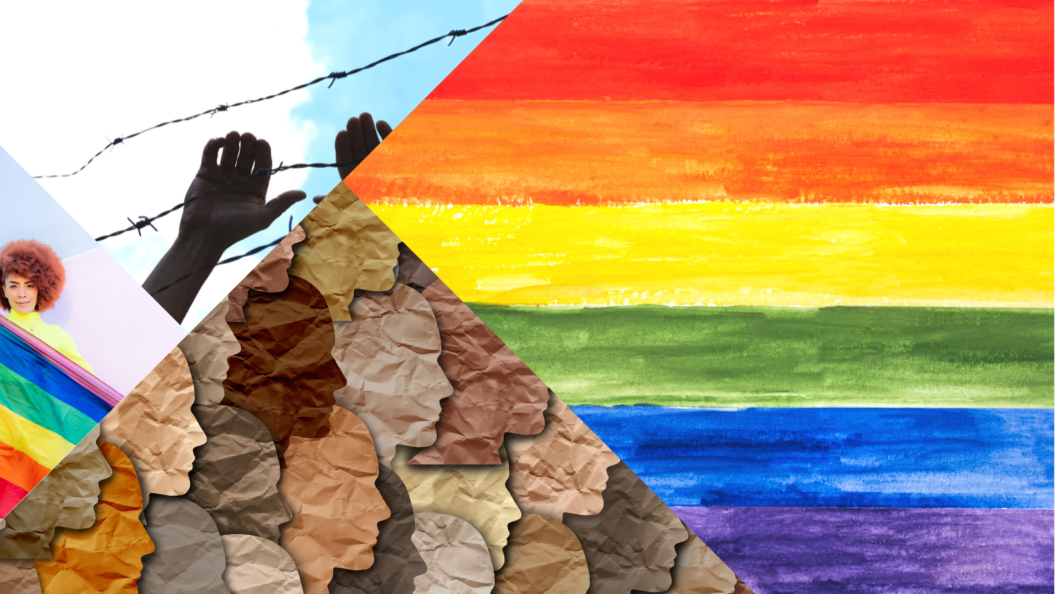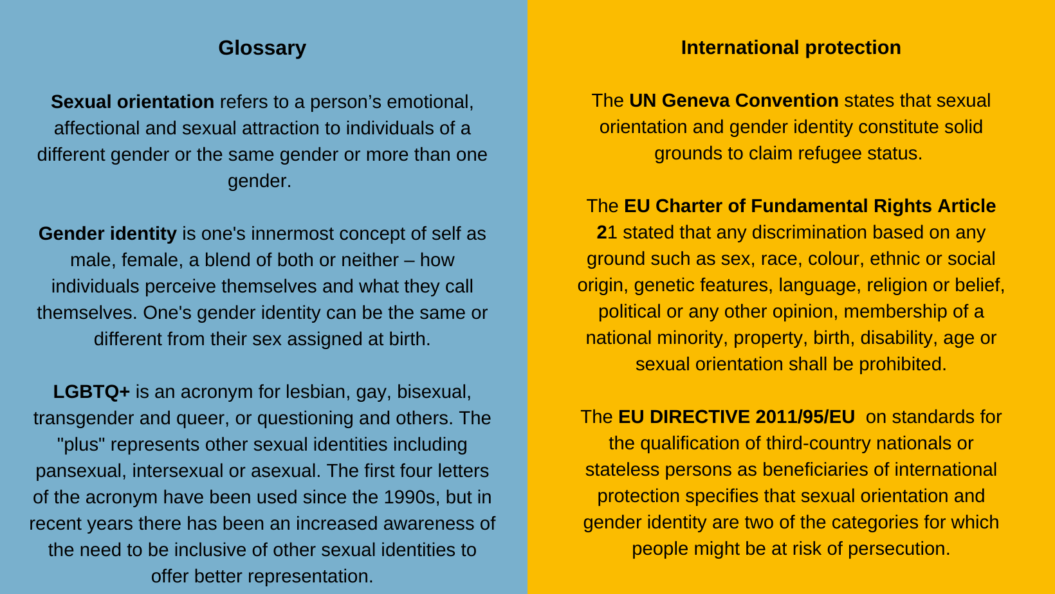
Pride month: celebrating diversity and raising awareness on the stand of equality for LGBTQ+ people among the most vulnerable groups
SCROLL DOWN TO WATCH THE VIDEO
June is Pride Month, a celebration of the equality for LGBTQ+ people achieved over the years, a call against homophobia and the opportunity to raise awareness about the discriminations this community still faces around the world.
As with many other communities, LGBTQ+ is a very heterogeneous community of people living different realities and stories. The acronym is used to represent a diverse range of sexualities and gender-identities and has been evolving with times to make it more inclusive and representative. Visibility of this diversity within the community is also an important element of the Pride celebration.

Within that diversity, to recognise the intersectionality of discrimination that many of their members can face is essential to continue giving visibility and support to those struggling the most.
Currently, there are almost 69 UN member States where homosexuality is criminalised by law , including the death penalty in six of them. In others, even if not criminalised by law, traditions and social norms make the life of LGBTQ+ people very difficult.
For those who chose to flee their home due to violence, discrimination, abuse or persecution, arriving in Europe may not mean the end of it. The EU Agency for Fundamental Rights has reported how discrimination in everyday life persists for LGBTQ+ in Europe– at work and at school; at cafés, bars and nightclubs; when looking for housing, accessing healthcare or social services; and in shops.
According to the Queer European Asylum Network (QUEAN), LGBTQ+ people seeking asylum remain often unrecognised and invisible in the system unless they specifically come forward and out themselves, providing proofs such as witnesses statements corroborating their sexual orientation or gender identity. A challenging requirement considering many of them may fear to talk about it and be discriminated against or put themselves and their families at risk.
Also, QUEAN points out the often lack of access to legal and social support LGBTQ+ people seeking asylum have, generating further isolation that can result in trauma, depression or self-harm. To the stress suffered from leaving your country behind and the uncertainty ahead, LGBTQ+ refugees also face the stress of feeling rejected or discriminated against in the host society and by other refugees, which can bring their mental health to a breaking point.
The SOGICA project “Sexual Orientation and Gender Identity Claims of Asylum: A European human rights challenge” funded by the European Research Council (ERC) concluded its 4-year research in 2020 highlighting 32 recommendations to the European Commission on the new EU LGBTQ+ Equality Strategy. This includes, among others:
➔ improving the statistical evidence base since, in Europe, there are still no clear and comprehensive statistics for claiming asylum on the basis of sexual orientation or gender identity (SOGI);
➔ providing information about asylum and the right to make a SOGI-based claim, including in easy-read formats and different languages, at a minimum at ports of entry and at asylum interview, reception and accommodation centres.
➔ ensuring adequate training for all parties, including decision-makers, judges, interpreters, and service-providers, to improve their confidence in the quality of their work as well as to benefit SOGI asylum claimants.
➔ paying particular attention to providing safe and adequate accommodation to LGBTQ+ asylum seekers, since these residents are more vulnerable to homophobic, transphobic, racist and anti-migrant violence and hate crime.
The situation for LGBTQ+ asylum seekers in reception facilities (including detention centres) is particularly problematic, facing very often homo- or transphobia, discrimination, bullying, and violence, in many cases from their compatriots.
ILGA Europe issued in 2014 a compilation of good practices, including conditions in reception facilities in:
★ Austria: transwomen are mostly placed in the house for unaccompanied women (no access for men). Where a medical expert states that the person needs hormone therapy, the asylum seeker will be accommodated in Vienna, as medical treatment is only available in the capital.
★ Belgium: upon arrival, information on the rules of no discrimination of any kind in the house and the consequences according to the law are explained. Where discrimination or violence towards LGBTQ+ asylum seekers occurs, the victim is informed of the right to file a complaint with the police, a disciplinary transfer of the perpetrator will be requested and that person can be temporarily removed from reception facilities. Information meetings and training for the staff are organised.
★ The Netherlands: the project “Willingness to report in case of discrimination” establish a social network for LGBTQ+ asylum seekers and to improve their safety. Working groups and thematic days on antidiscrimination for staff as well as a protocol have been delivered. LGBTQ+s who are confronted with violence are placed within sight of security people.
When it comes to giving visibility, many artists have captured in different ways the realities of the LGBTQ+ migrant and refugee community.
The GAYROPA project offers a visual journey into the lives of LGBTQ+ people, who migrated to Europe because of their identities. “Gayropa” is a word often used by Russian authorities to refer to Europe. It is meant to signify Russia’s lack of acceptance of LGBTQ+ people’s equality. As an answer to that polarisation, this project documents the unity and togetherness of LGBTQ+ people from around the world, who are claiming asylum, or have been granted asylum in various European countries based on their sexuality or gender identity.
Recently awarded at Lux Audience Award, Sundance Festival and Festival de Cannes 2022, and nominated in 3 Oscar’s categories, Flee tells a poignant story of belonging and the search for identity by the filmmaker Jonas Poher Rasmussen. Amin’s life has been defined by his past and a secret he’s kept for over 20 years. Forced to leave his home country of Afghanistan as a young child with his mother and siblings, Amin now grapples with how his past will affect his future in Denmark and the life he is building with his soon-to-be husband. Told brilliantly through the use of animation to protect his identity, Amin looks back over his life, opening up for the first time about his past, his trauma, the truth about his family, and his acceptance of his own sexuality.
You can watch the synopsis here, get tickets for a screening or rent it and enjoy it at home.
Join us in celebrating diversity and raising awareness about the many discriminations we still need to combat, especially for the most vulnerable of our society #happypridemonth #CelebrateDiversity.
Watch our video to advocates for the equality of LGBTQ+ people seeking asylum in the EU :
References:
https://ilga.org/ilga-world-releases-state-sponsored-homophobia-December-2020-update
https://fra.europa.eu/en/publication/2020/eu-lgbti-survey-results